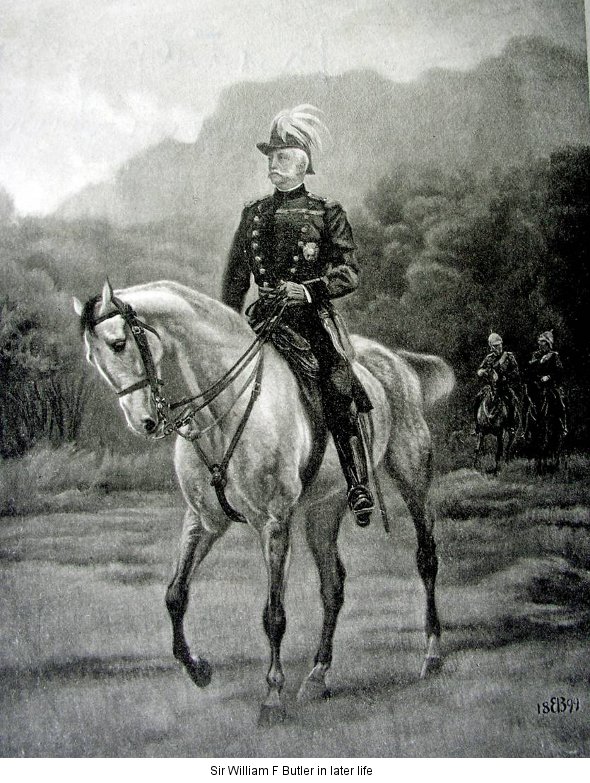Journal Volume 6 2010
Sir William F. Butler (continued/12)
South Africa 1898-1899
Late in October 1898 Butler was summoned to the War office and asked to take over the military command of the Cape due to the death of General Goodenough. He was very reluctant but, professional as ever, accepted that his personal preferences and family life had to be subservient to the wishes of his superiors. It then came to light that Butler was also being asked to take over the civil administration because Sir Alfred Milner, the High Commissioner, was coming home.

Butler discovered on arrival in South Africa in November 1898 that there was a strident media campaign promoting military action against the Boer Republics of the Transvaal and the Orange Free State. Gold had been discovered at Witswaterand in 1886 and the Transvaal was immediately swamped by an influx of miners. Two consequences followed:
-
-
The Boers already nervous following the Jameson raid became very apprehensive and prepared for an armed response to any threat
-
Rhodes and his supporters initiated a media campaign in the Cape and Natal complaining that the new white immigrants were being abused by the Boer authorities and demanding intervention by the British Government
-
Butler came under pressure to plan a military offensive against the Boers which he resisted for three reasons:
-
-
He was convinced that the media campaign and the reports being fed back to London were mischievous and were motivated by plain greed
-
Contrary to the settlers’ naïve assumption that the Boers would be cowed by a show of force, he believed that there were inadequate military resources to invade the Boer republics and he doubted that those available would even be capable of resisting a Boer attack
-
Whilst he disapproved of the Boers’ treatment of the native Africans, he believed that they only wished to live in peace and that they could be incorporated into British administered confederation if their aspirations could be assured
-
These perceptions underpinned the policies he pursued and the advice he fed back to the War Office and the Colonial Office. It was not the attitude that Milner and his supporters wanted and it did not appeal to the imperialist faction in politics and the civil service in London. He advised the War Office that ‘war between the white races coming as a sequel to the Jameson raid would be the greatest calamity that ever occurred in South Africa’.
Realising that his advice was unacceptable Butler tendered his resignation which was gratefully accepted. He returned to England in August 1899.
The second Boer War broke out in October 1899 and everything Butler had predicted came to pass. The Boers besieged the available British forces in three cities: Ladysmith, Mafeking and Kimberly. The efforts to relieve the besieged cities resulted in a series of military defeats at Magersfontein, Stormberg, Colenso and Spion Kop. It took huge transports of troops from Britain to retrieve the situation and the Boers were not defeated in the field until June 1900. Even then they continued a guerrilla campaign which only ended in May 1902 after a scorched earth policy by the British authorities. The numbers speak for themselves:
-
-
A British force of 450,000 was needed to subdue the Boers
-
22,000 British soldiers died
-
7,000 Boer fighters died
-
25,000 Boers died in concentration camps, mainly women and children
-
14,000 Africans died as either soldiers or civilian casualties
-
When he reached England Butler discovered that there was a campaign in Government circles and in the London press to denigrate him. He was represented as an Irish Catholic, a nationalist, disloyal to the Empire, neglectful of his duty and favouring the Boers. He besought the War Office to defend him against charges which as a serving officer he could not himself refute, but without success. Even after he had left South Africa he was blamed for the succession of defeats suffered by an incompetently led and inadequately trained army. He got some small comfort from a growing awareness that he had in fact warned of the foolhardiness of a military initiative and he was quoted as having advised that a force of 200,000 would be needed to subdue the Boers. In 1903 the Government set up a commission to investigate the conduct of the war. Butler defended his actions very ably and the publication of its report in 1904 found no fault with him. In fact he was appointed to investigate a scandal about war stores during the South African War which led to the exposure of serious corruption in procurement of supplies for the army.
In 1905 Sir William Butler retired from the army after 47 years service.


